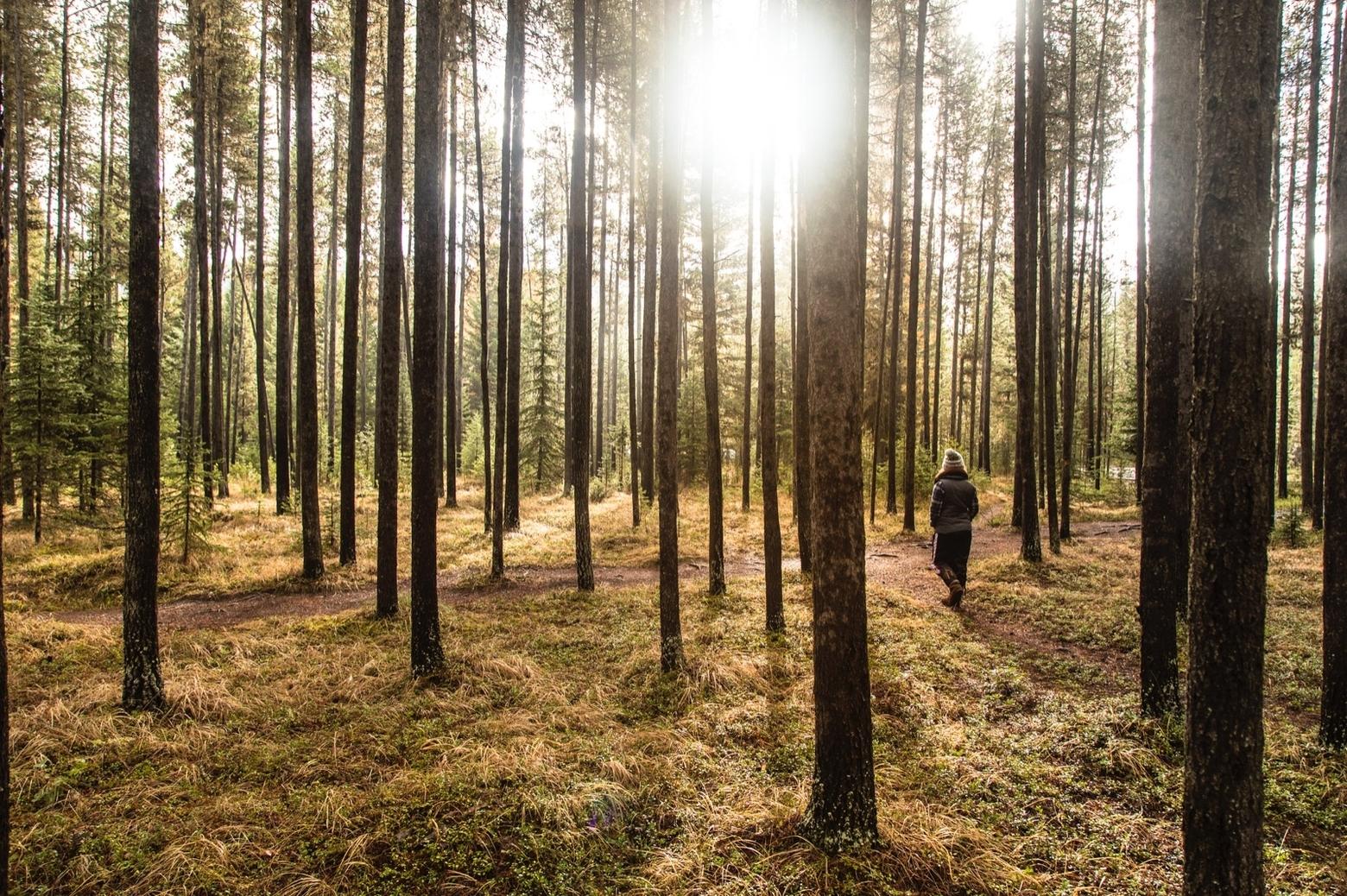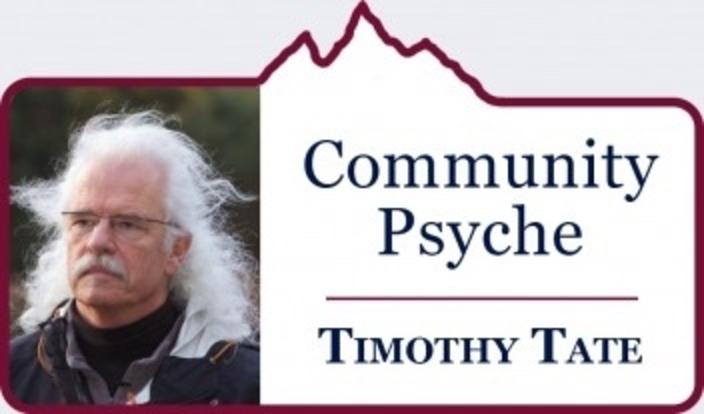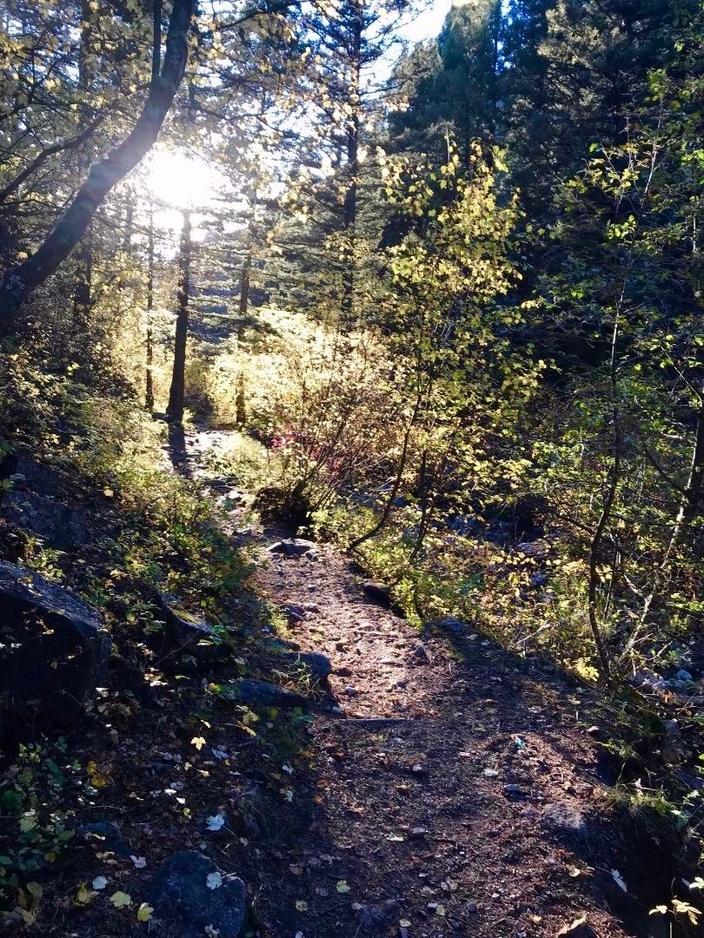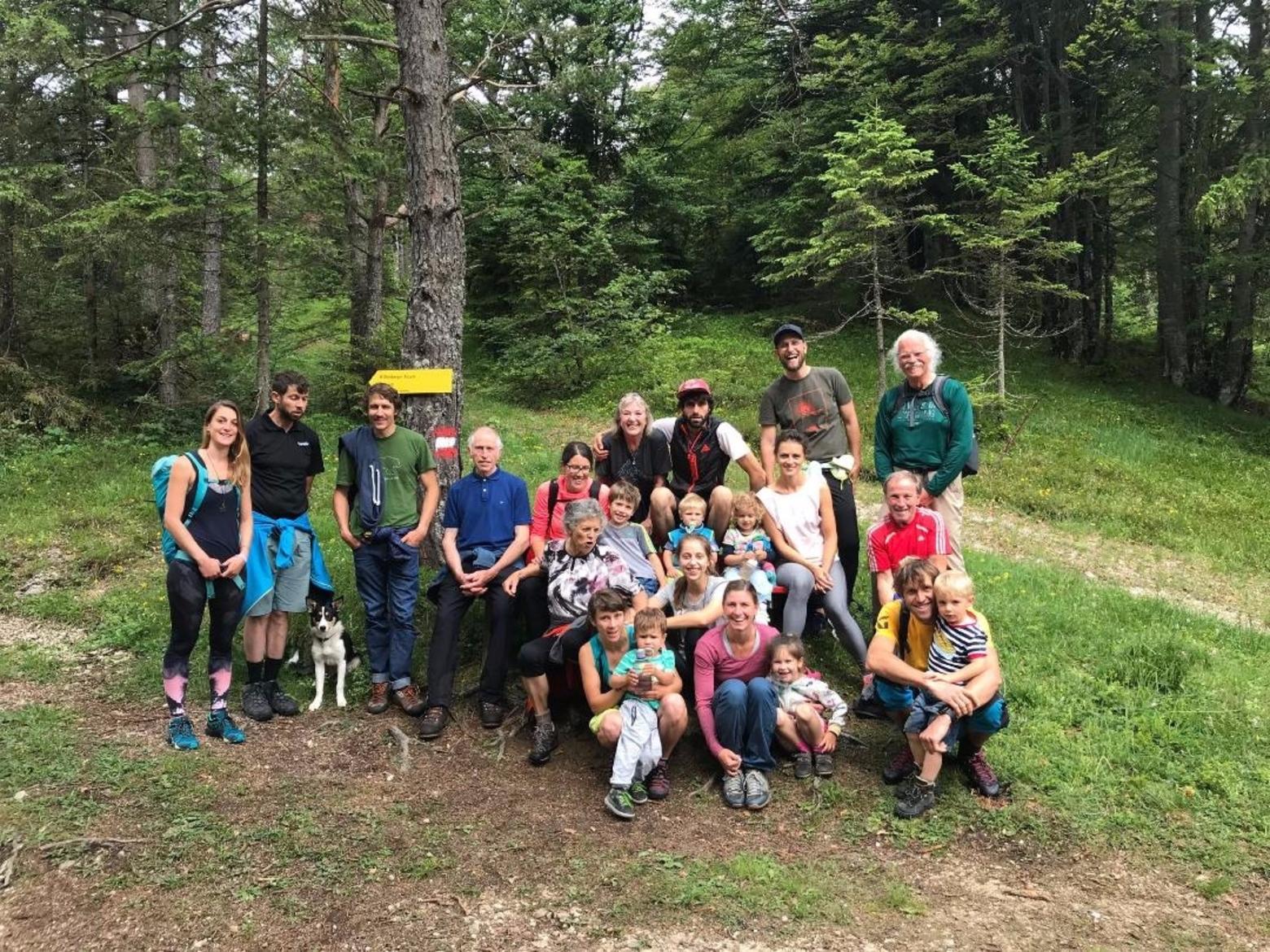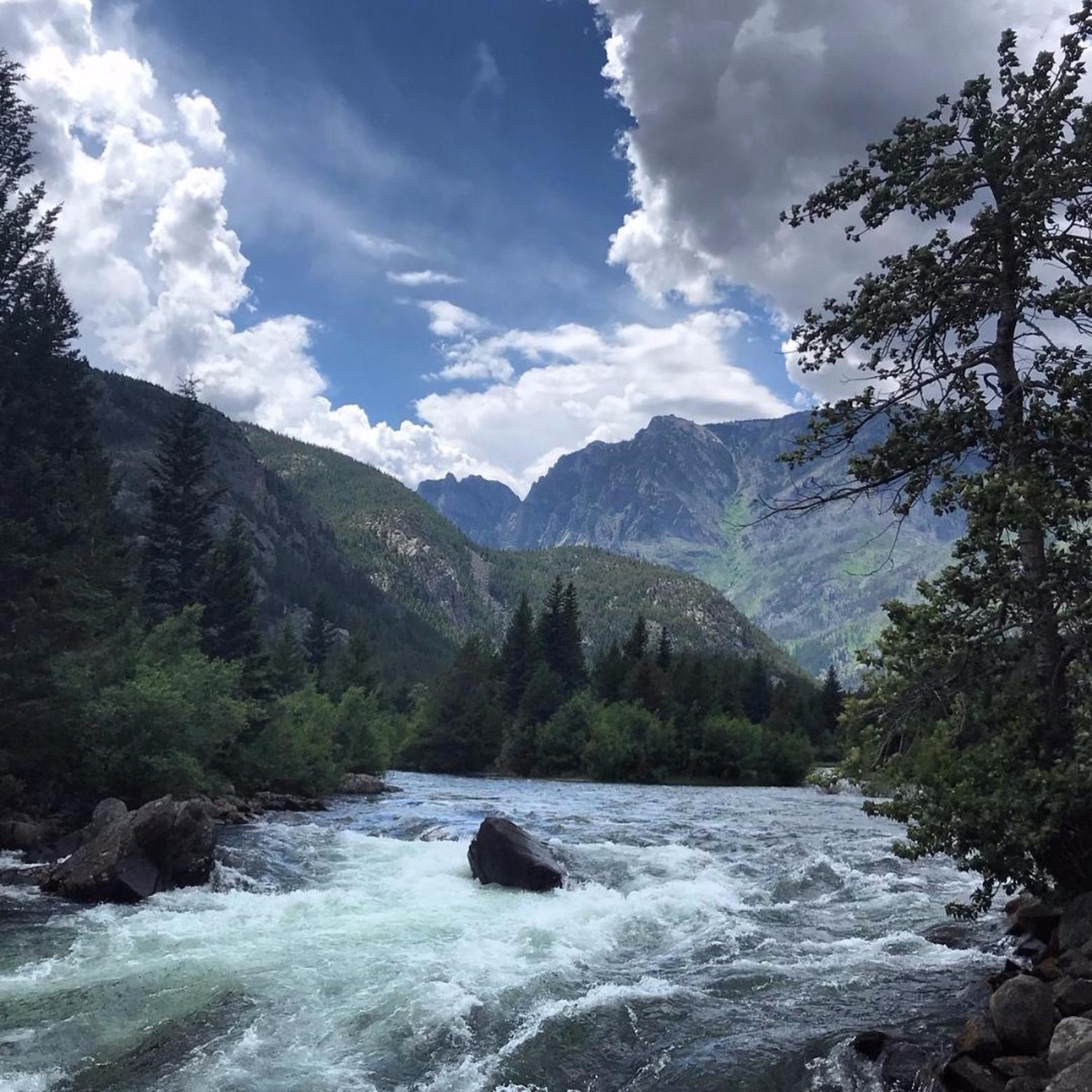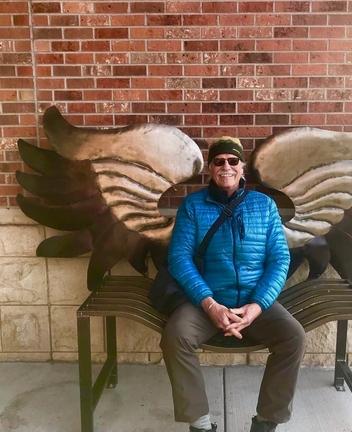Back to StoriesPeace Of Mind Along The Slow, Plodding Path
July 23, 2019
Peace Of Mind Along The Slow, Plodding PathHow trail therapy delivers a perfect dose of meaning
Not long ago I took a hike with a young man up into the Middle Cottonwood drainage north of Bozeman along the western face of the Bridgers. It was a Sunday mid-morning walk completing a four-day Fourth of July holiday break. Summer unofficially begins for us who live north of the 45th parallel on this weekend, even though we old timers have stories of the Independence Day celebration damped by snowstorms.
Banking on mountain weather prediction is as dependable as politicians; arbitrary and capricious. Like today for example, the temperature at 7:45 a.m. is 45 degrees and days later the temperature peaks at 86 followed by “severe” thunderstorms. Mind you, dramatic weather patterns might be the global new norm but in Montana mountain country it’s already our long-established way. We don’t mind, we deal with it, it’s called “gear.”
My daypack on another trip to the Stillwater Woodbine trail was stuffed with water sandals, Tenkara rod and fishing necklace, rain coat, down vest, binoculars, mixed nuts, two water bottles, and first aid pouch. And this was all for a four-mile hike along the cascading thunderous Stillwater River gorge which sports enough fresh snow melt water and negative ions to awaken even the most depressed person.
I thought about my son and his 10-year-old daughter ensconced up in the Beartooth Mountains at Timberline Lake nestled beneath the Silver Run Plateau. “The lake has a beautiful turquoise hue resulting from glacial melt,” states the MTHikes.com site. It also states that the trail climbs 2,000 feet in 4.5 miles making it a relatively steep trail.”
I wondered, after the forecasted thunderstorm took shape over the mountains how grandaughter Erika would do with the shock wave of high country mountain thunder claps. Hunkered down in a tent that magically provides comfort and a felt sense of shelter from such storms snapped my memory circuits back to when my son was a similar age and how we also ventured up into the alpine wonderland as he has done with his other daughter and I have with mine.
A parent backpacking with one youngster while others wait at home for their return is a page torn from the oldest playbook around: the adventure of a right of passage. We forget, in our abundance of privilege, that it doesn’t happen in many other parts of urbanized America.
° ° ° °
By the nature of my practice and interest in what young people are thinking, I enjoy staying in touch with those who are entering into adulthood with frameworks for how they see the world put together.
The young man I mentioned earlier was Bozeman product Ryan Garnsey, who in his early 20s is working on a trail crew in Yellowstone National Park. How wonderful that a local kid, now grown, is forming his own novel relationship with our oldest national park that lures people from around the world, yet many Bozemanites often take it for granted.
Is it possible for us to finds parts of ourselves there the way others do?
I have known Ryan since he was a baby, am friends with his parents Bridget and Tom, and a fan of the band he sits in on keyboards, with his dad on vocals and guitar, called “The Hooligans.”
Ryan and I have forged a friendship over the years and we deepened its resonance on our hike. Stimulation did not need to come from an amp or a rush of adrenaline. We talked of philosophy and other things. He’s off to Germany for a spell to study in Saarbrucken and Leipzig. Although studying philosophy at the University of Montana might seem like an arcane pastime, for me it is the foundation of a logical, rational worldview upon which a reflective life is built.
No matter what you’re “trained” to do in this life, a lot of living is done in the areas beyond our material, physical and psychological comfort zones and that’s where continuous growth happens, as opposed to those who, over time, wither spiritually and perish. The comfort zone in today's world is often defined by its fast pace and not allowing mind to thoroughly process what is in front of us.
We discussed the German philosophers, in particular Friedrich Nietzsche (1844-1900) whose commentaries on existentialism and even Nihilism tend to be favorite musings for young men of a certain age.
This philosopher and cultural critic laid down the intellectual tracks that influenced Freud and Heidegger in ways that I studied at Ryan’s age, in Germany, and have shaped my sense of the real and valuable ever since. As with trails that wend through the wilderness, tracks laid down in our cultural landscape orient my journey through these challenging times of modernity.
Days after our hike Ryan sent these words of Nietzsche thanking me for our time together on the trail: “When one has finished building one’s house, one suddenly realizes that in the process one has learned something that one really needed to know in the worst way—before one began."
It is a reference to the eternal and distasteful lament of making a discovery "too late.”
How do we deal with the regret of not doing things and gaining an insight that opens us up to a new way of seeing? What constitutes the dreaded “too late” for each of us is the type of question that comes to me as I start a hike but recedes into the background as the rigors of hiking engage my body and mind.
Trails are on my mind, having written about our local trail challenges and growing levels of inattentiveness and lack of civility in my recent Mountain Journal column. I think what we're really after is that solace that comes from inner solitude.
I listened attentively to Ryan, him explaining what it’s like for a lad to forge or rehabilitate trails in the backcountry of a pre-eminent icon of wildness. His crew hikes in eight to 16 miles to get to the designated work site spending up to six days off the grid digging in the dirt and rock restoring trails.
Local trails, heavily trafficked and easily accessible national forest/Wilderness trails, backpacking trails, and national park backcountry trails are the veins of our mountain minds. These veins nourish my body and mind in ways that otherwise would not occur. As I’ve written earlier, the ability to walk and talk on mountain trails bereft of poorly-trained pet dogs and aggressive mountain bikers, fulfills a European romantic notion and its own form of therapy. One that I experienced directly and recently in the Austrian Alps.
° ° ° °
As part of my counciling work with The North Face mountaineering company, I was called to the Innsbruck, Austria region on a mission to serve the Austrian families who lost their sons in a tragic accident in the Canadian Rockies this last April. It involved a trio of North Face-sponsored climbers.
The Auer family and Rensi Lama (David Lama’s Nepalese father) joined the Roskelley’s and North Face athletes and managers for a weekend gathering to share in the grief of their loss.
We had gathered twice before, once in the Redwoods, directly in the aftermath, and then in Spokane to honor Jess Roskelley, but this time it was on Hansjorg Auer and David Lama’s home turf.
North Face has developed a model of encampment that features a Friday travel and arrival day, a Saturday outing on either mountain bikes, hiking or climbing, then a Sunday departure to points wide flung. The logistics and expense of such gatherings underscores the commitment North Face has to their team of athletes which includes young emerging talents and those who loom large as their mentors who have climbed mountains before.
My role in such events is to bring a capacity to subtly and sincerely appreciate differing perspectives of our wisdom traditions to bear on the reality of irretrievable loss.
I introduced the assembled folk on Friday evening and again on Saturday night as well as participated in one of the Saturday activities, which for me was to join the Auer extended family on a hiking trail in the Austrian Alps up from the burg, Steinberg am Rofan, some 60 kilometers or so distant from Innsbruck in the Tyrolean region.
Trails have a way of bringing people together for meaningful relaxed conversations they might not otherwise have. I was pleased and grateful that my once fluent German was reactivated enough to at least carry on a halting yet intimate and engaged talk with Frau Auer, the mother of lost son, Hansjorg.
Perhaps I will write on the ground swelling, swirling, sucking sound of grief another time. Suffice it to say that the trail was once again the medium for shared emotions and memories wound around each other intimately like only mountain habitat can host.
Is this also a romanticized notion that trails open lines of communication not only between us but with nature? If so, then we need more of it.
Aren’t the trees, after all, communicating with each other as expressed in the disturbing and evocative novel Overstory by Richard Powers?
Are not the Mountain Chickadees conducting business in their banter? How about Pleurocapous moss spreading across spring fed granite fissures adorning the trails suggesting softness and resilience? Is the water suggesting to its stream where to flow after a rainstorm or can it not help itself spillover? And what about the variegated flora of the high country? Do Indian Paintbrushes choose which color to display, attracting a particular form of attention?
Who knows, but what I do know is that once we walk away from the ruts of our ordinary daily life in town a world awaits that is abuzz with conversation. Alpine hikes loosen the grip of the mundane. A common type of psychological therapy is to help those whose minds are racing focus only on breathing, as a way to let their minds settle into the eternal now encompassing a single moment.
Hiking in the mountains, at slow speed, in rhythm, harmony and soaking in the surroundings, does the same thing. So often we’re merely racing through to connect dots between points A and B, traveling so fast we can’t recall much of what we’ve passed or passed through. Why? Because we weren’t paying attention, aligning our power as sentient entities with the kind of sentience that does not exist in a state of mind when you are thinking of avoiding running into trees, not contemplating various kinds of sensual contact.
Who knows, but what I do know is that once we walk away from the ruts of our ordinary daily life in town a world awaits that is abuzz with conversation. Alpine hikes loosen the grip of the mundane. A common type of psychological therapy is to help those whose minds are racing to focus only on breathing, as a way to let their minds settle into the eternal now encompassing a single moment. Hiking in the mountains, at slow speed, in rhythm, harmony and soaking in the surroundings, does the same thing.
° ° ° °
And so it as with the Auer clan. We walked through neighboring farms where the consensus on access is centuries old. At first I walked and talked with Joyce Roskelley, Jess’s mom. We are similar in age and have forged a friendship over the last sorrow filled months. Read the column I wrote about their clan by clicking here.
As the eight-mile hike evolved other hikers would move next to me and initiate a conversation about a brother, son, or partner. The pitch of the path would determine how much breath filled the lungs as did the rock tiled stream bed beckon for a hand to be held in its crossing.
We took a lunch break in a meadow overlooking mountains both Hansjorg and David had scampered about in their childhood triggering memories, stories and tears. I was deeply touched by Herr and Frau Auer’s alpine stoicism. The things that had fed their spirits was present and wouldn’t have been felt moving faster than a human’s trekking pace.
They knew what their son had been called to do; together, they had enjoyed the method of slowly scaling mountain pitches on family outings. They believed in his skill set—including the act of deep contemplation—even as I do in my son’s capacity to weather severe mountain storms and bring our granddaughter safely back home. It’s a nonverbal contract we sign with our aspirations.
Lest I wax too poetic skipping over the troubles that can fasten like barnacles to our lives, consider this example of how we have surrendered to what I call DataGods locked into our screens and tracking our every movement, as if they, not our memory, are the records of where we’ve been.
° ° ° °
I was catching breakfast the other day at Jam, one of the local downtown Bozeman eateries, before my weekly Friday morning radio show on KGLT. An extroverted tourist and his girlfriend sat down next to me and began questioning me about sights to be seen.
My breakfast cooled off during the exchange but their love of what they had experienced so far and the allure of the mountains made the exchange worth it. They reminded me what we locals take for granted. At one point I asked what he did in New Jersey and although he was speaking English I had to chase after what he was saying, ladened as it was with terms common to data users.
One of his tasks was monitoring the efficacy of microchips implanted in psychopharaceudical medication specifically aimed at tracking, along with a patch, its patient’s use. He assumed wrongly that as a psychotherapist I was aware of this system, which I wasn’t.
I know the drug he was referencing is an atypical antipsychotic medication used in the treatment of schizophrenia and bipolar disorder as well as major depressive episodes and occasionally used to temper irritability associated with autism.
What I did not know is that a precedent has been set. I will not take you down this path of Orwellian drama in any detail. There is an abundance of reliable information on your external tracking device about this phenomena of prescribing medication always as the first resort. I am not asserting here that medication isn’t effective or necessary in many circumstances, but not all cases.
What I am saying in conclusion is that our post 1984 world has successfully transfixed our devotion to the ancient gods of quick information and expectation of instant remedy: the fleet-footed Mercury of Roman fame and Hermès of the Greeks. They are known for their speed and esteemed as gods of merchants, travelers and, oh yes, thieves and tricksters.
I am convinced that part of the collective woe we are experiencing as a society is environmental—in that we are detached from the evolutionary womb that birthed us, that so many of us can’t slow our minds and bodies down.
As in any form of zealous devotion we become protective of, and defined by, the respective gods we serve.
I comprehend these cycles of devotion by my attention to archetypes as the human psyche moves through life phases.
We are taught to rush, but, as Nietzsche referenced, it has caused us to lose track of what we need to know—what's not always visible in the hurry of modern life. If we bound through the forest at 30 miles an hour just to work up a sweat and can’t recollect much about the journey, were we really there? Does the stuff we could have seen along the way matter? And if we conclude it doesn't matter, then why would we care about it?
What caught my attention was when fellow traveler Ian said to me at Jam that while they were in the backcountry of Glacier National Park they had no cell reception. Left blissful as a result, he shared his relief in not connecting to his data portal but how overwhelmed he was when technology came rushing back at him again when he turned his device back on and yet without it they had felt fully plugged in.
Ethically and as part of professional protocol, I must say that anyone who is depressed, going through difficult times, and feels alone and struggling, ought to seek out medical help.
At the same time, am I suggesting that a peaceful walk in the woods with an attentive friend is a panacea for some of what ails us? Sure, it never hurts, but more to the point, those of us who live in the mountains know the extent to which we venture into the high country on mountain trails at slow speed is the degree to which we can refresh the psyche.
Nature is indeed a powerful drug and there’s no warning on a prescription label suggesting you might OD.
I’m not telling you something you didn’t already know, though I leave it up to you to measure your own dosage.

